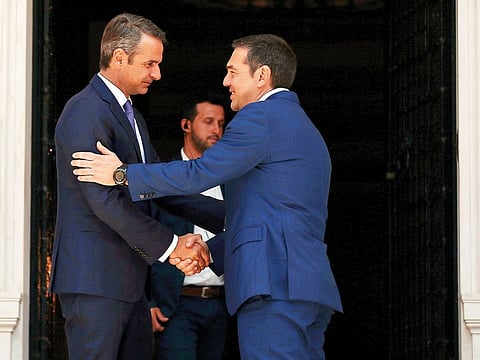What Mitsotakis’ victory means for Greece
Four things we learned from the Greek election

Athens: Kyriakos Mitsotakis will have to move swiftly to tackle a raft of lingering economic problems when he’s sworn in as Greek prime minister on Monday.
Investors expect the 51-year-old New Democracy leader, whose conservatives secured a healthy parliamentary majority in Sunday’s national election, to prove his business-friendly reputation is deserved. The former banker and management consultant will need to make good on pledges to address issues including government finances, soured loans and crippling bureaucracy, while working within the tight fiscal constraints creditors have set for the country.
Although he has inherited an economy on the mend and a stock market that’s soaring, they are rebounding from shrunken bases. Mitsotakis must ensure that Greece can attract the investment it desperately needs and create jobs as the country digs itself out of a financial crisis that has lasted more than a decade and took a toll on living standards.
“The weight of responsibility is heavy,” Mitsotakis said in his victory speech in Athens Sunday night. “I assume the burden with complete awareness of the situation the country is in.”
Here are four things we have learned from the 2019 Greek general election:
Return of two-party rule?
With Greece finally exiting a gruelling 10-year crisis, the country’s political scene seems to be reverting to the two-horse race of old, with the leftist Syriza party of defeated PM Alexis Tsipras replacing the once-mighty socialist Pasok party as the main foil for the conservative New Democracy party of Sunday’s victor, Kyriakos Mitsotakis.
Together, New Democracy and Syriza on Sunday combined had over 70 percent of the vote, numbers not seen since 2009.
In the 2012 election, at the height of the financial crisis and with the political scene in shambles, the two leading parties combined for less than 36 percent.
In 2009, the top two parties had accounted for just over 77 percent of the electorate. In 2007, it was nearly 80 percent.
Family affair
Mitsotakis becomes the latest in a long line of Greek prime ministers stepping into a post once held by their father - and on occasion, their father’s father - that goes back to the 19th century.
Mitsotakis’s father Constantine, one of Greece’s longest-serving parliamentarians, was prime minister from 1990 to 1993.
In a country where such links are not uncommon in politics, Mitsotakis’s family connections are unprecedented with his nephew also currently holding the post of mayor of Athens.
The capital’s new mayor Costas Bakoyannis was elected in May. His mother Dora was Athens’ first female mayor during the 2004 Olympics.
The electoral success of the two men confirms the leading position now occupied by the Mitsotakis clan, eclipsing the Papandreou and Karamanlis among the country’s historic families.
In 2009, George Papandreou became the third in his family to lead the country, after his father Andreas and his namesake grandfather Georgios.
A few years before that, Costas Karamanlis had attempted to fill the shoes of his uncle Constantine Karamanlis, the man who ushered Greece into the European economic community.
Lure of the beach
Pollsters had feared a mass walkout in the first midsummer election since 1928, and the lure of the beach was indeed strong - abstention was around 42 percent, a result consistent with steadily falling voter turnout this past decade.
Mitsotakis had famously urged Greeks to go out and vote, even as temperatures hit 38 degrees Celsius in parts of the country.
“You have enough time to go to the beach and then vote,” the conservative leader had said during the campaign.
In May, fewer than 59 percent of registered voters cast their ballots for the European Parliament and the first round of local and regional elections. A week later, participation fell below 42 percent for the second round of local elections.
A decade earlier, nearly 71 percent of the electorate had cast their votes.
Voting is officially compulsory in Greece and abstention is theoretically punishable by law, but the penalty is never applied.
Underdogs have their day
Off-the-wall underdogs will often have their day in a Greek election. In 2015, voters gave the nod to Vassilis Leventis, a frail 63-year-old who has spent most of his life railing against corruption on a TV talk show.
This time, it was the turn of another late-night, oft-satirised TV veteran to shine: Kyriakos Velopoulos, head of new nationalist party Greek Solution.
Velopoulos, who is strongly pro-Russian and keeps a photo of Vladimir Putin in his office, has been condemned by church officials for peddling letters allegedly written by Jesus Christ.
The fledgling leader has also faced derision for promoting hair loss lotion that clearly has not helped his own balding pate.



